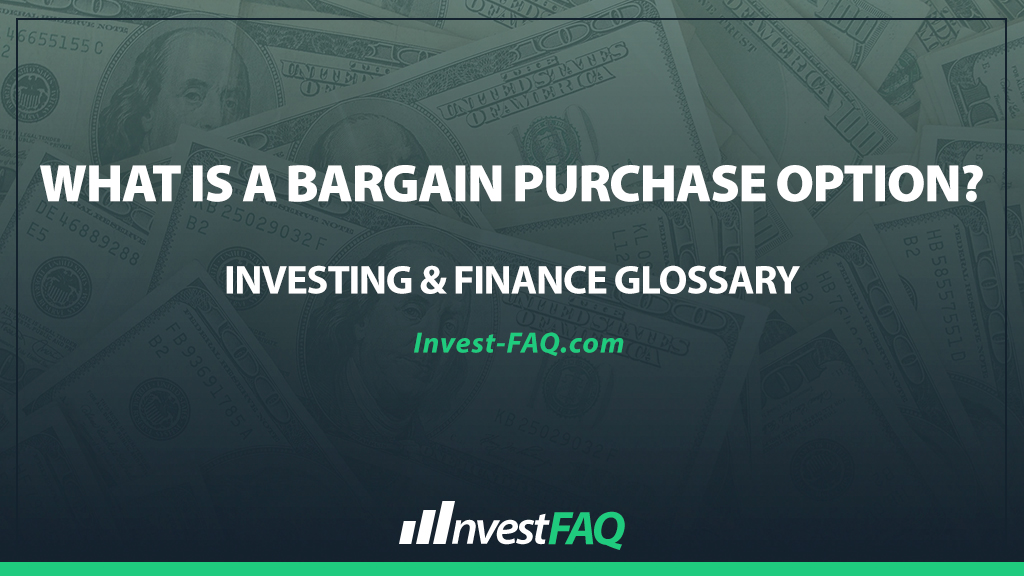
Bargain Purchase Option
Contents
A bargain purchase option is a clause in a lease agreement that allows the lessee to purchase the leased asset at the end of the lease term at a price significantly lower than the expected fair market value. This option provides a financial advantage to the lessee, encouraging them to eventually own the asset.
In business, a bargain purchase option is often used in equipment leasing agreements or real estate leases to provide flexibility and potential cost savings for lessees.
It’s an attractive feature for companies looking to use the latest equipment or occupy specific premises with the option to purchase them at a favorable price in the future.
This option can influence a company’s decision between leasing and buying an asset outright, depending on their long-term plans and financial capacity.
Example of a Bargain Purchase Option
Let’s consider “QuickPrint,” a printing company that enters into a five-year lease for a high-capacity printer with a bargain purchase option. The lease stipulates that QuickPrint can buy the printer at the end of the lease for $10,000, whereas the expected market value at that time is estimated to be $50,000.
Upon entering the lease, QuickPrint records the leased asset and lease liability in its balance sheet based on the present value of lease payments, including the bargain purchase price. At the end of the lease term, if QuickPrint exercises the bargain purchase option, it would record:
Leasehold Improvement (Asset): Increase by $10,000 (the exercise price).
Cash (Asset): Decrease by $10,000.
Lease Liability: Decrease to zero, concluding the lease agreement.
In this scenario, QuickPrint benefits financially from the bargain purchase option by acquiring the printer for $40,000 less than its estimated market value, effectively transforming a leasing agreement into a purchase at a significantly reduced cost.
The accounting treatment reflects the transition of the asset from a leased item to owned property, with the final payment transferring ownership and eliminating the lease liability.
This strategic decision allows QuickPrint to capitalize on the financial advantage offered by the bargain purchase option, improving its asset base while managing cash flow effectively.
Significance for Investing & Finance
The bargain purchase option holds significant importance in accounting for several reasons:
Asset Management: It offers companies a strategic pathway to acquire assets at below-market prices, enhancing their asset portfolio and long-term financial planning.
Financial Reporting: Proper accounting for leases with bargain purchase options ensures compliance with accounting standards, accurately reflecting a company’s commitments and future financial obligations.
Tax Implications: The exercise of a bargain purchase option may have tax implications, affecting a company’s tax liability depending on the jurisdiction and specific tax laws related to asset acquisition and depreciation.
Decision Making: The option provides a tangible financial incentive, influencing leasing versus buying decisions and long-term strategic planning regarding asset utilization and ownership.
In summary, a bargain purchase option is a valuable feature in lease agreements, offering lessees the opportunity to acquire assets at favorable prices. By understanding and strategically managing these options, businesses can significantly enhance their financial and operational planning, asset management, and compliance with accounting standards.
FAQ
How does a bargain purchase option in a lease agreement affect a company’s decision to lease or buy?
A bargain purchase option provides a company with the financial flexibility to lease an asset with the option to purchase it at a lower cost in the future, often influencing the decision to lease rather than buy upfront due to the potential cost savings and reduced initial capital outlay.
What are the accounting implications of exercising a bargain purchase option?
Exercising a bargain purchase option requires the lessee to adjust their financial statements to reflect the asset’s acquisition at the bargain price, including reclassifying the lease as an asset purchase and adjusting the asset and liability accounts accordingly.
Can a bargain purchase option impact a company’s long-term financial strategy?
Yes, a bargain purchase option can significantly impact a company’s long-term financial strategy by allowing it to acquire valuable assets at below-market prices, potentially enhancing the company’s asset base and future profitability.
Are there any tax considerations a company should be aware of when including a bargain purchase option in a lease?
Companies should consider potential tax implications, such as how the bargain purchase option might affect depreciation deductions and any taxable income resulting from the lease-to-own conversion, requiring careful tax planning and consultation with tax professionals.
